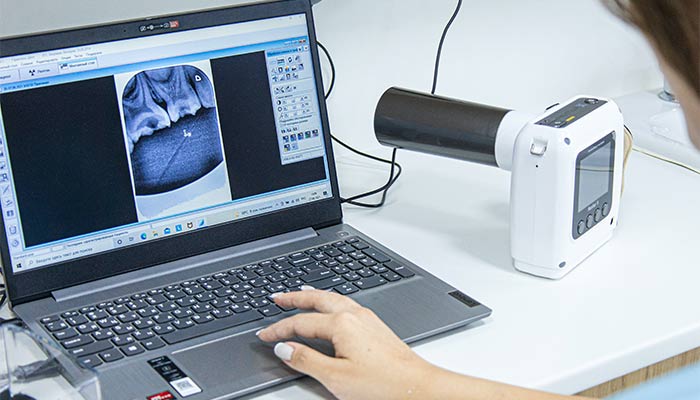What is the role of AI in healthcare?
In recent months, people have been talking a lot about the role of AI in healthcare, and there’s no sign that the use of this technology will slow down, well, ever.
Machine learning has many uses in healthcare, from mobile coaching to finding new drugs.
Many healthcare leaders are still too afraid to try out AI because they are worried about privacy, data integrity, or the fact that too many organizational silos make it hard to share data. We’ve talked about the main problems with using AI in health care.
However, there are significant connections between the future of healthcare and artificial intelligence and machine learning.
Following the publication of our in-depth guides on Blockchain in Healthcare and Artificial Intelligence in Pharma, we’ve chosen to focus on the beneficial effects of the emergence of artificial intelligence in the healthcare sector.
AI Healthcare Examples:

Medical diagnostics:
They are using Artificial Intelligence to figure out what kind of disease a patient has. Check out our report on what experts in the field have to say here. Also, in March 2019, a report was released about an AI platform to help find and predict cancer.
Finding new drugs:
Dozens of health and pharmaceutical companies are using artificial intelligence to help find new drugs and speed up the long processes and time it takes to find new drugs and get them to market. If you’re interested in this topic, check out our report called The Pharma Industry in the Age of AI: The Future is Bright.
Clinical Trials:
Clinical trials are a mess, which is a shame. Most clinical trials are run offline, and no integrated solutions can keep track of progress, data collection, and the results of drug trials. Here you can read about how AI is changing how clinical trials are done. Also, you might be interested in the Healthcare Weekly podcast episode with Robert Chu, CEO of Embleema, where we talk about how Embleema is using AI and blockchain to change clinical trials.
If you’re interested in Blockchain in healthcare, you might also be interested in our Global “Blockchain in Healthcare” Report: the 2019 ultimate guide for every executive.
Pain management:
This is just the beginning of the healthcare industry’s focus in this area. It turns out that by using virtual reality and AI, we can create simulated realities that can take patients’ minds off their pain and even help with the opioid crisis. Here, you can find more information about how this works. The Johnson and Johnson Reality Program, which we’ve discussed here, is another great example of how AI and VR work together. In short, J&J has created a simulated environment that doctors can use to learn how to do their jobs better. This environment is based on rules-based algorithms.
Improving patient outcomes:
Patient outcomes can be improved in many ways, some of which are driven by artificial intelligence. Start by reading our report on how Amazon’s Alexa is changing healthcare and listening to our Healthcare Weekly Podcast with Helpsy’s CEO, Sangeeta Agarwal. Helps has made the first AI nurse in the form of a chatbot that helps cancer patients at every stage of their fight against the disease.
These are simply a few instances; they are not intended to be comprehensive descriptions of artificial intelligence in healthcare. Let’s look at more specific examples that every healthcare executive should know about in 2019.
What applications does artificial intelligence have in medicine?
In the medical field, artificial intelligence works by analyzing and making sense of huge amounts of data sets. This helps doctors make better decisions, manage patient data more efficiently, make personalized medicine plans from complex data sets, and find new drugs.
Let’s examine each of these great use cases in more depth Ai in healthcare
Clinical decision support
With pattern detection of health issues detected significantly more correctly than by the human brain, AI in healthcare might be valuable inside clinical decision support to assist clinicians in making quick judgments.
In a field where time is taken, and decisions can change a patient’s life, saving time and figuring out what’s wrong are very important.
Informatics (both physician and patient)
AI in healthcare is a great way to help doctors and patients keep track of their information. When telemedicine is used, patients can see their doctors faster or not at all. Doctors and nurses will find this easier and more convenient, and patients will feel better.
AI-driven educational modules can also help doctors learn more and improve their jobs. This is another example of how AI can be used to manage information in healthcare.
AI in pharma (exec summary)
In 2016, about $5 billion was put into AI companies, and it’s no surprise that healthcare is one of the fastest-growing industries. By 2021, more than $6.6 billion will be put into the healthcare industry.
Mobile coaching options
With real-time data collection, mobile coaching solutions offer advice to patients and help them get better results from their treatments. In the past few years, telemedicine has also been a big push, with companies using AI in smartphone apps to make minor diagnoses.
Personalized medicine
The ability to look at a lot of information about a patient to find ways to treat them. Cloud-based systems that can understand natural language make it possible for the technology to find possible treatments.
Acquisitions
Acquisitions continue to help both large and old biotech companies meet their need for innovation. With the development of Artificial intelligence, there’s a lot to offer regarding company control.
When startups combine AI and healthcare, it gives older and bigger companies more ways to get information, systems, and even the people who make huge leaps in technology.
Drug discovery
Another excellent use for AI is in the field of medication research, where pharmaceutical corporations can incorporate cutting-edge technology into the costly and drawn-out process of drug discovery.
With the focus on saving time and recognizing patterns when testing and finding new drugs, the benefits of AI are clear right away.
In the early stages of drug discovery, start-ups like BenevolentAI and Verge Genomics use algorithms that look through parts of the data for patterns that are too complicated for humans to see. This saves time and helps us come up with new ideas that we might not have been able to come up with otherwise.
